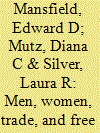| Srl | Item |
| 1 |
ID:
139531


|
|
|
|
|
| Summary/Abstract |
In this paper, we provide one of the first systematic analyses of gender's effect on trade attitudes. We draw on a unique representative national survey of American workers that allows us to evaluate a variety of potential explanations for gender differences in attitudes toward free trade and open markets more generally. We find that existing explanations for the gender gap, most notably differences between men and women in economic knowledge and differing material self-interests, do not explain the gap. Rather, the gender difference in trade preferences and attitudes about open markets is due to less favorable attitudes toward competition among women, less willingness to relocate for jobs among women, and more isolationist non-economic foreign policy attitudes among women.
|
|
|
|
|
|
|
|
|
|
|
|
|
|
|
|
| 2 |
ID:
153557


|
|
|
|
|
| Summary/Abstract |
The dominant approach to the study of international political economy assumes that the policy preferences of individuals and groups reflect economic self-interest. Recent research has called this assumption into question by suggesting that voters do not have economically self-interested preferences about trade policy. We investigate one potential explanation for this puzzling finding: economic ignorance. We show that most voters do not understand the economic consequences of protectionism. We then use experiments to study how voters would respond if they had more information about how trade barriers affect the distribution of income. We find that distributional cues generate two opposing effects: they make people more likely to express self-serving policy preferences, but they also make people more sensitive to the interests of others. In our study both reactions were evident, but selfish responses outweighed altruistic ones. Thus, if people knew more about the distributional effects of trade, the correlation between personal interests and policy preferences would tighten. By showing how the explanatory power of economic self-interest depends on beliefs about causality, this research provides a foundation for more realistic, behaviorally informed theories of international political economy.
|
|
|
|
|
|
|
|
|
|
|
|
|
|
|
|